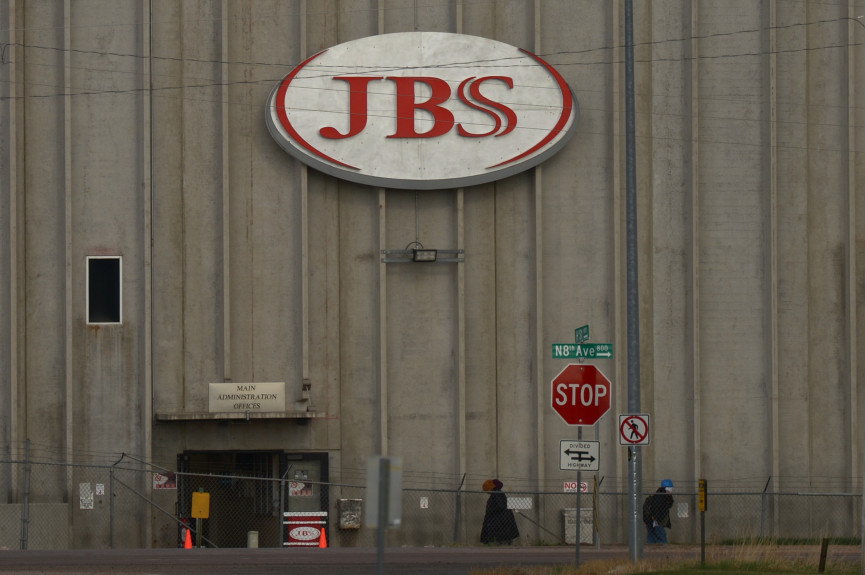
GREELEY, CO – APRIL 10 : JBS – Greeley Beef Plant in Greeley, Colorado on Friday. April 10, 2020. (Photo by Hyoung Chang/The Denver Post)

Share
Last week’s closing of Smithfield’s pork processing plant in Sioux Falls, South Dakota has put a spotlight on the dangers facing workers in the food supply industry. When it shut down, the plant had 644 confirmed cases of COVID-19 which makes Sioux Falls the number one hotspot per capita for the disease nationwide and represents nearly half of all confirmed cases in that state.
Meatpacking plants are dotted in small towns all over the Midwest where workers are overwhelmingly immigrants and refugees. While South Dakota is 84% white, 73% of all workers that tested positive are people of color.
Jordan Bruxvoort, Director of the Naomi Project, a Sioux Falls workers’ and immigrants’ rights organization knew many workers through church activities. at a Friday press call he stated that,
“Leading up to this outbreak, they [Smithfield workers] were under significant physical and psychological stress, with sore arms, hands, and backs. The psychological stress of COVID-19 has only exacerbated that, and people there do not feel that the measures taken to protect them have been sufficient. Now, my friends at this church are dealing with an overwhelming reality; 10 members of the congregation have been diagnosed with COVID-19, one of whom was the man from El Salvador who passed away.”
Conditions in South Dakota have impacted Worthington in Southwest, Minnesota.
At a Friday daily COVID-19 press conference, Minnesota Governor Tim Walz indicated that workers at Smithfield also work at the JBS plant in Worthington, Minnesota. “There’s also a lot of family members that work in both plants,” Walz said.
Today, JBS announced the indefinite closure of the Worthington pork processing plant.
“We don’t make this decision lightly,” said a statement from Bob Krebs, President of JBS USA Pork. “We recognize JBS Worthington is critical to local hog producers, the U.S. food supply and the many businesses that support the facility each and every day.”
Prior to the closure on Friday, the United Food and Commercial Workers Union (UFCW) Local 663, which represents workers at a JBS plant in Worthington, were calling on management to slow production at the pork processing facility, reporting 19 COVID-19 infections among employees there.
“Production line speeds inside JBS and other food processing plants in Minnesota must be immediately slowed to make safe social distancing between workers possible,” said Matt Utecht, President of UFCW Local 663.
He warned, “Failure to make this critical safety improvement will put our community and our nation’s food supply at devastating risk.”
These problems in the food supply chain are extensive.
The Intercept reported that a Smithfield plant in Cudahy, Wisconsin where “managers initially concealed the number of infections, pressured employees to avoid quarantine measures, and failed to provide any face masks or dividers” closed down on Wednesday.
Smithfield, has a long history of worker injuries and fatalities. The company often uses foreign guest workers, many of whom have reported abusive treatment. In 2007, a number of guest workers from Thailand working in Smithfield plants reported slave-like conditions.
On Saturday, The Daily Beast reported that a JBS meatpacking plant in Greeley, Colorado had a “work while sick” culture — and didn’t even bother to shut down until eight days after the first COVID-19 death of an employee.
“The Weld County Department of Public Health and Environment sent a letter to the JBS USA facility in Greeley on April 4, and referenced warnings the agency made to company officials on April 2—five days before the first reported death of one of the facility’s employees on April 7,” reported researcher William Bredderman. “JBS idled the beef processing operation on April 15, but not before dozens more of its 4,500 workers became infected and at least four died.”
Nick Levendofsky, Director of External Affairs for Rocky Mountain Farmers Union and Board Chair of RuralOrganizing.org, said at a Friday press conference,
“everyone in the food system is valued, but the reality is, without immigrant workers, we don’t eat. We should not take that for granted at any point, let alone now. As some of the most vulnerable individuals in our food system, they deserve our respect, and they deserve to be protected from the spread of disease where they work.”

